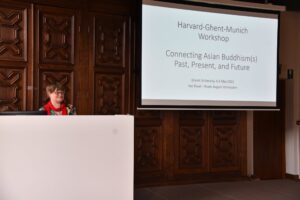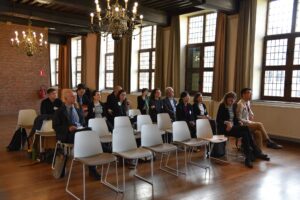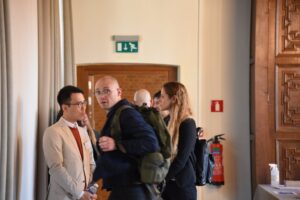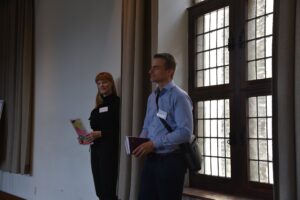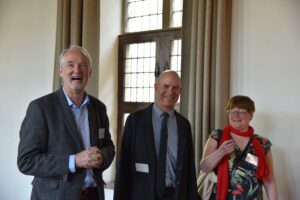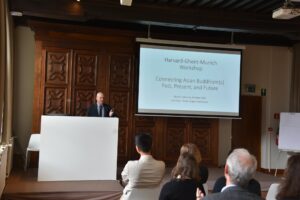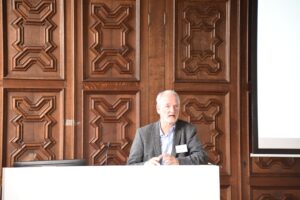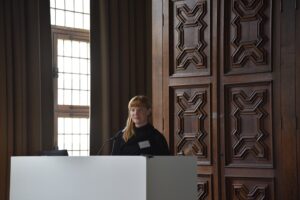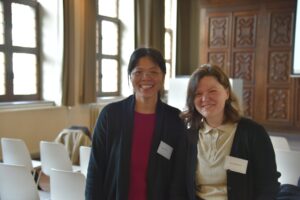Venue: Het Pand, room August Vermeylen, Onderbergen 1, 9000 Gent
The workshop is sponsored by the Strategic Institutional Partnership (SIP) scheme, the Tianzhu Foundation, and Ghent University, Harvard University, and the Ludwig Maximilian University of Munich.
Ghent Centre for Buddhist Studies (GCBS), University of Ghent, SIP organizing committee:
- Lindsey DeWitt Prat, FWO Postdoctoral Research Fellow
- Mick Deneckere, FWO Postdoctoral Research Fellow
- Anna Andreeva, Assistant Professor
- Ann Heirman, Professor and Chair, GCBS Director
- Mathieu Torck, Teaching and Research Fellow
- Christoph Anderl, Professor
We are grateful for the participation of the workshop’s two mentors:
James Robson, Professor, Harvard University
James Robson is the James C. Kralik and Yunli Lou Professor of East Asian Languages and Civilizations at Harvard University, the Victor and William Fung Director of the Harvard University Asia Center; the Chair of the Regional Studies East Asia (RSEA) program, and the Director of the Harvard Summer School in Kyoto program at Doshisha University. He was also recently appointed as a Harvard College Professor (2020-2025). He received his Ph.D. in Buddhist Studies from Stanford University in 2002. He specializes in the history of East Asian religious traditions. He is the author of Power of Place: The Religious Landscape of the Southern Sacred Peak [Nanyue 南嶽] in Medieval China (Harvard Asia Center, 2009), which was awarded the Stanislas Julien Prize for 2010 by the French Academy of Inscriptions and Belles-Lettres [Prix Stanislas Julien by the Académie des Inscriptions et Belles-Lettres (Institut de France)] and the 2010 Toshihide Numata Book Prize in Buddhism, and the editor of the 2015 Norton Anthology of World Religions: Daoism (W.W. Norton & Company). He is the co- editor of Images, Relics and Legends–The Formation and Transformation of Buddhist Sacred Sites (Toronto) and Buddhist Monasticism in East Asia: Places of Practice (London: Routledge). His currently completing a book titled The Daodejing: A Biography (Princeton University Press, Lives of Great Religious Books Series).
Jens-Uwe Hartmann, Professor, Ludwig Maximilian University of Munich
Cf. https://www.indologie.uni-muenchen.de/personen/ehemalige-professoren/hartmann/index.html
This workshop brings together early and advanced career scholars from three institutions (Ghent-Harvard-Munich) to discuss and deepen research on and connections between Buddhist traditions in Asia. We aim to promote intellectual exchange, provide a rich learning and networking opportunity for early career researchers, and build capacity for diverse leadership and participation in the Buddhist Studies community. Within the workshop, early career scholars share their research with peers and a panel of senior faculty serving as workshop mentors. Participants engage in collaborative inquiry and scholarly discourse while at the same time receiving individual feedback and mentorship.
Program
May 4 (Wed)
9:00–9:15 Opening and welcome remarks (Ghent SIP Organizing Committee)
9:15–10:00 “Meet and greet,” self-introductions and short remarks by workshop mentors James Robson and Jens-Uwe Hartmann
Session 1 Chair: Lindsey DeWitt Prat
10:00–10:30 Kate Hartmann (Harvard University): Making the Invisible Real: Practices of Seeing in Tibetan Pilgrimage Literature
10:30–11:00 Q&A and feedback
11:00–11:30 Long break
11:30–12:00 Nan Ouyang (Ghent University): The “Revolution” of Chinese Buddhism of the Mao Era: A Study of the Monastic Life on Mt. Jiuhua (1949–1978)
12:00–12:30 Q&A and feedback
12:30–14:00 Lunch break (self-organized)
Session 2 Chair: Anna Andreeva
14:00–14:30 Constanze Pabst von Ohain (University of Munich): Buddhist Utopias as Indicators of Societal Conditions
14:30–15:00 Q&A and feedback
15:00–15:10 Short break
15:10–15:40 Julia Cross (Harvard University): Research on Mummies, Relics, and Nuns in Medieval Japan
15:40–16:10 Q&A and feedback
16:10–18:30 Free time, walk in town
19:00–21:00 Dinner (self-organized)
May 5 (Thu)
Session 3 Chair: Ann Heirman
9:00–9:30 Anna Sokolova (Ghent University): The Regional Spread of Vinaya Traditions in the Seventh to the Ninth Centuries China
9:30–10:00 Q&A and feedback
10:00–10:30 Long break
10:30–11:00 Lina Verchery (Harvard University): Shifting Scales, Building Bridges: Doing Buddhist Studies in the Micro and the Macro
11:00–11:30 Q&A and feedback
11:30–11:40 Short break
11:40–12:10 Seongho Choi (University of Munich): Yogācāra Curriculum for Bodhisattva Carrier
12:10–12:40 Q&A and feedback
12:40–14:00 Lunch (self-organized)
Session 4 Chair: Henry Albery
14:00–14:30 Charles DiSimone (Ghent University): Building Castles from the Sands of Time as the Tide Slowly Rises: Reflections on Buddhist Studies in the Kaliyuga
14:30–15:00 Q&A and feedback
15:00–15:10 Short break
15:10–15:40 Jin Kyoung Choi (University of Munich): The Sanskrit fragments of the Viniścayasaṃgrahaṇī in St. Petersburg, in Kathmandu, and in Tibet
15:40–16:10 Q&A and feedback
May 6 (Fri)
Session 5 Chair: Lindsey DeWitt Prat
9:00–9:30 Billy Brewster (Harvard): Saṅghabhadra’s Arguments for the Existence of an Intermediate State (Antarābhava) between Dying and Reincarnation as Translated by Xuanzang (602?–664 C.E.)
9:30–10:00 Q&A and feedback
10:00–10:10 Short break
10:10–10:40 Henry Albery (Ghent University): Constructing a Database of Buddhist Narratives
10:40–11:10 Q&A and feedback
11:10–11:20 Short break
11:20–12:00 Roundtable discussion led by advanced career scholars
12:00–12:15 Closing remarks
Update: workshop pictures
